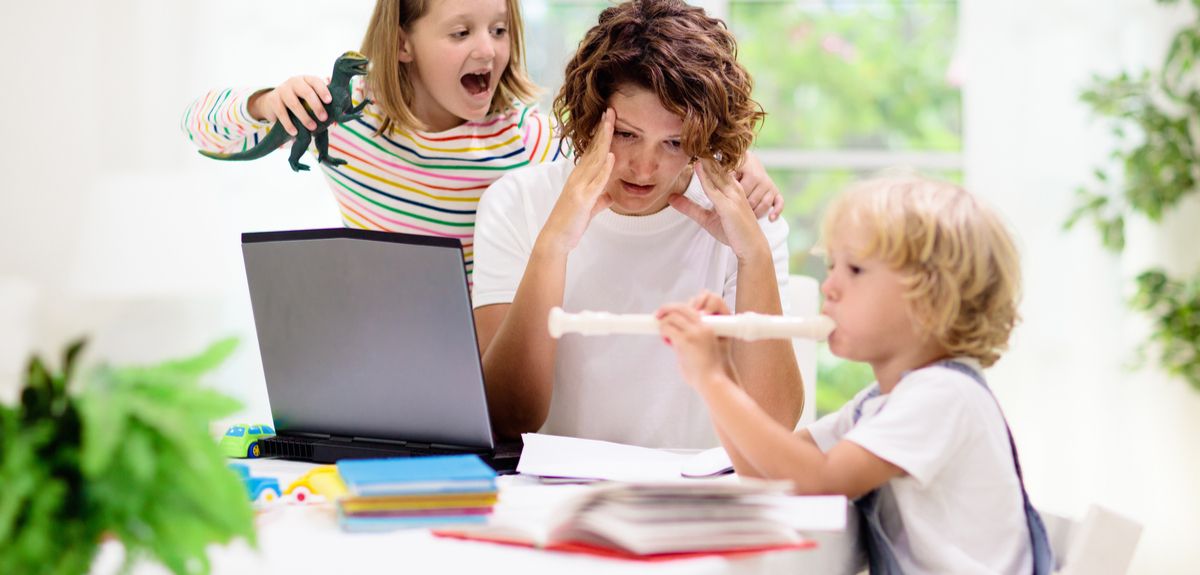
Image credit: Shutterstock
Major stressors for parents during COVID-19 revealed in new report
Work was cited as the most frequent source of stress for parents, followed by their children's wellbeing
The interim report from 5,000 responses to the Co-SPACE (COVID-19 Supporting Parents, Adolescents, and Children in Epidemics) survey led by experts at the University of Oxford, indicates some important concerns for parents, employers and health professionals. Parents cited work as their most frequent source of stress while in lockdown, followed by worries over their children's wellbeing and education.
Families with children who have special education needs and neurodevelopmental disorders report even higher levels of stress across all area. 80% of families who were previously receiving support from social services say it's been stopped or postponed, leaving them with further challenges.
Professor Cathy Creswell, Departments of Psychiatry and Experimental Psychology, University of Oxford, said, “This study is so important to understand the experiences of families currently and how this crisis is impacting on them, but also so we can know how best to support families going forward. Our results are showing some hotspots of concern, particularly for parents of children with special education needs and neurodevelopmental disorders. These parents report increased stress across all areas, including managing their children’s behaviour, they also express a desire for personalised support from professionals.”
Other highlights from the interim report:
- Parents particularly want support around their child’s emotional wellbeing, education and coming out of social isolation
- Nearly half the parents/carers thought that their child was concerned about family and friends catching the virus
- A third of parents/carers reported that their child was worried about missing school
The Co-SPACE survey aims to track children and young people’s mental health throughout the COVID-19 crisis. Survey results will help researchers identify what protects children and young people from deteriorating mental health, over time, and at particular stress points, and how this may vary according to child and family characteristics. It also aims to identify what advice, support and help parents would find most useful.
Parents/carers are invited to complete an online longitudinal questionnaire monthly until social distancing measures end. The first survey takes about 15-20 minutes, and subsequent surveys about 10 minutes. Parents/carers will be asked to answer questions about family life and relationships, overall health and well-being, parenting, psychological symptoms and how they and their child are coping during the Covid-19 pandemic. In collaboration with colleagues at University College London, parents of 11-16 year olds are also invited to give permission for their adolescent to take part and give their own perspective on how they are getting on. To complete the survey, visit the Co-SPACE website.
Regular summaries of key findings are made available via the UKRI Emerging Minds (www.emergingminds.org.uk) research network website throughout the study and will be shared directly with partner organisations in health and education services and the community and voluntary sector, to inform the development of effective support for children, young people and families.
This research is supported by the NIHR Oxford Health Biomedical Research Centre, the Oxford and Thames Valley NIHR Applied Research Consortium and the UKRI Emerging Minds Network Plus.
 Sheldonian Series launches with an energetic and open exchange of views on 'Democracy'
Sheldonian Series launches with an energetic and open exchange of views on 'Democracy'
 New study reveals the explosive secret of the squirting cucumber
New study reveals the explosive secret of the squirting cucumber
 Ethiopian wolves reported to feed on nectar for the first time
Ethiopian wolves reported to feed on nectar for the first time
 Professor Anthony Harnden appointed as the new Chair of the MHRA
Professor Anthony Harnden appointed as the new Chair of the MHRA
 New study reveals global trends for menstrual tracking app use
New study reveals global trends for menstrual tracking app use